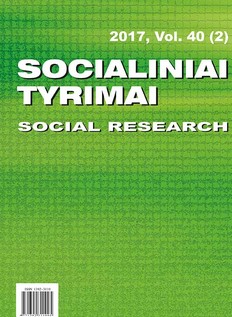Į sekėją orientuota lyderystė ir emocijos: tarpdisciplininė perspektyva
Follower-Centric Leadership and Emotions: an Interdisciplinary Perspective
Author(s): Inga Minelgaite, Eglė VaičiukynaitėSubject(s): Neuropsychology, Organizational Psychology, Behaviorism
Published by: Vilniaus Universiteto Leidykla
Keywords: follower-centric leadership; emotional contagion theory; neuroscience; leader; follower;
Summary/Abstract: In leadership, a follower-centric approach, that emphasizes the importance of the follower in the leadership process presenting one of the latest approaches in leadership research, is considered to be one of the fields that can advance the leadership theory as well as contribute to developing more effective leadership within an organization. During the dyadic interaction between the leader and the follower, emotions play a key role and can enhance the outcomes of the leadership process as well as improve the overall performance of the organization. Despite the importance of the follower in leadership, previous studies have been paying more attention to the leader’s emotions and their influence on the follower’s performance. Moreover, these studies and leadership literature fail to explain the importance of emotions during the leader-follower interaction and do not include the most recent developments in diverse disciplines, e.g., social neuroscience, psychology. Consequently, there are gaps in literature regarding the interactions between the leader and the follower from the perspective of the exchange of emotions. A key aspect in the dyadic interaction between the leader and the follower is that the follower’s emotions can influence the leader’s emotions even though up till now leadership research has been mainly focusing on the effects of the leader’s emotions on the follower. Hence, emotions of individuals participating in the communication process are sort of exchange and influence both individuals who are taking part in communication. Literature suggests that emotional contagion develops between the interacting individuals. The emotional contagion theory has captured researchers’ from different disciplines,,e.g., psychology, neuroscience attention but is still poorly represented in leadership research and literature. The most recent literature in the field of leadership calls for research integrating perspectives and paradigms (see Anderson et al, 2008) to advance the leadership theory and contribute to more effective leadership in an organization. A need for such research is relevant due to a broad spectrum of fields of science that present the most recent and promising findings regarding the emotional contagion process and can be beneficial to the development of the leadership theory and contribute to its advancement. Based on the above, the purpose of this article is to explain the dyadic interaction between the leader and the follower through the review of diverse literature on the theory of emotional contagion in e.g., neuroscience, neuroleadership psychology and to lay out the propositions how to describe the process of emotional contagion between the leader and the follower. Analytical, interpretative and comparative research methods were used. The findings of this theoretical study suggest that follower-centric approaches vary in leadership depending on the underlying theoretical approach. Literature on follower-centric leadership emphasizes followers’ active role in the leadership process and the leader’s influence on them, affecting the outcomes of the leadership process. A follower-centric approach presents a different perception of followers as not just sole observers but also as evaluators of leadership. Furthermore, followers are considered to be the main evaluators of the leader and leadership effectiveness since leadership is not leadership unless it is recognized as one by the follower.
Journal: Socialiniai tyrimai
- Issue Year: 40/2017
- Issue No: 1
- Page Range: 38-46
- Page Count: 9
- Language: Lithuanian

